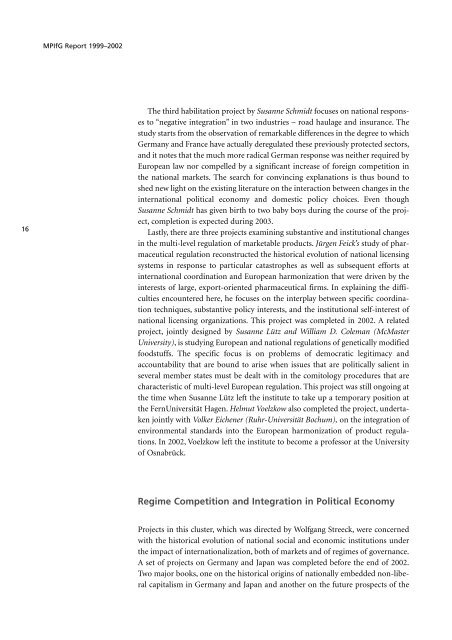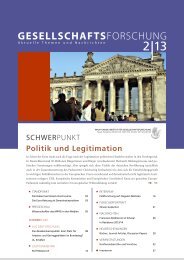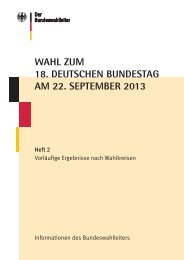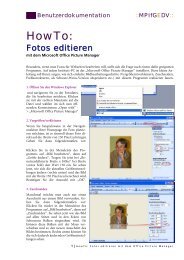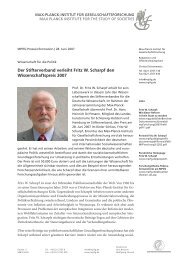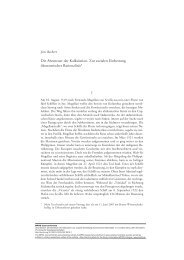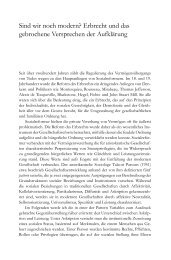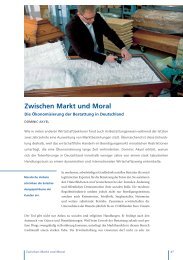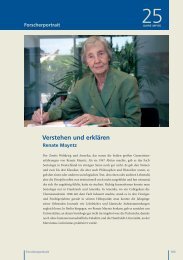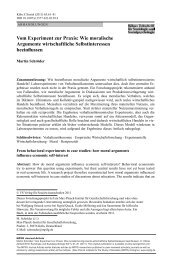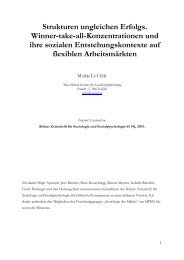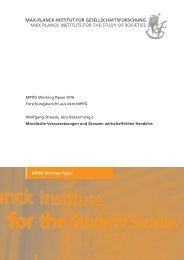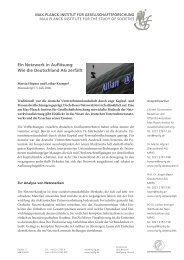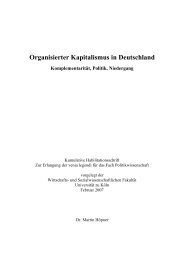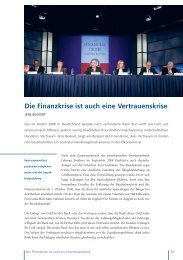Publications - MPIfG
Publications - MPIfG
Publications - MPIfG
Create successful ePaper yourself
Turn your PDF publications into a flip-book with our unique Google optimized e-Paper software.
16<br />
<strong>MPIfG</strong> Report 1999–2002<br />
The third habilitation project by Susanne Schmidt focuses on national responses<br />
to “negative integration” in two industries – road haulage and insurance. The<br />
study starts from the observation of remarkable differences in the degree to which<br />
Germany and France have actually deregulated these previously protected sectors,<br />
and it notes that the much more radical German response was neither required by<br />
European law nor compelled by a significant increase of foreign competition in<br />
the national markets. The search for convincing explanations is thus bound to<br />
shed new light on the existing literature on the interaction between changes in the<br />
international political economy and domestic policy choices. Even though<br />
Susanne Schmidt has given birth to two baby boys during the course of the project,<br />
completion is expected during 2003.<br />
Lastly, there are three projects examining substantive and institutional changes<br />
in the multi-level regulation of marketable products. Jürgen Feick’s study of pharmaceutical<br />
regulation reconstructed the historical evolution of national licensing<br />
systems in response to particular catastrophes as well as subsequent efforts at<br />
international coordination and European harmonization that were driven by the<br />
interests of large, export-oriented pharmaceutical firms. In explaining the difficulties<br />
encountered here, he focuses on the interplay between specific coordination<br />
techniques, substantive policy interests, and the institutional self-interest of<br />
national licensing organizations. This project was completed in 2002. A related<br />
project, jointly designed by Susanne Lütz and William D. Coleman (McMaster<br />
University), is studying European and national regulations of genetically modified<br />
foodstuffs. The specific focus is on problems of democratic legitimacy and<br />
accountability that are bound to arise when issues that are politically salient in<br />
several member states must be dealt with in the comitology procedures that are<br />
characteristic of multi-level European regulation. This project was still ongoing at<br />
the time when Susanne Lütz left the institute to take up a temporary position at<br />
the FernUniversität Hagen. Helmut Voelzkow also completed the project, undertaken<br />
jointly with Volker Eichener (Ruhr-Universität Bochum), on the integration of<br />
environmental standards into the European harmonization of product regulations.<br />
In 2002, Voelzkow left the institute to become a professor at the University<br />
of Osnabrück.<br />
Regime Competition and Integration in Political Economy<br />
Projects in this cluster, which was directed by Wolfgang Streeck, were concerned<br />
with the historical evolution of national social and economic institutions under<br />
the impact of internationalization, both of markets and of regimes of governance.<br />
A set of projects on Germany and Japan was completed before the end of 2002.<br />
Two major books, one on the historical origins of nationally embedded non-liberal<br />
capitalism in Germany and Japan and another on the future prospects of the


